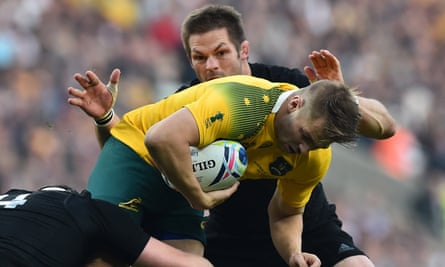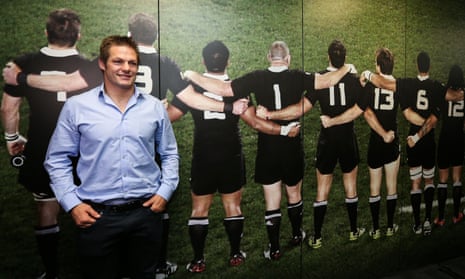“They were never going to miss me and DC,” Richie McCaw says with a smile. He is sitting in a conference room at the Manhattan headquarters of his old team’s sponsor, AIG. On message, he is wearing all black – but not All Black. The captain retired last year, with 148 caps, two World Cups and the gratitude of a nation now revelling in the havoc wrought upon Australia in Sydney. In Wellington on Saturday, they may perpetrate another 42-8 mauling – or something worse.
DC, the great fly-half Dan Carter, now lives and plays his rugby in Paris. McCaw hasn’t left home, but he also watched the Sydney Test from afar – in Rio de Janeiro, where he spent a happy couple of weeks watching the Olympic Games.
“I was quite impressed, actually,” he says, with habitual understatement, of such an ominous All Black performance at the start of a run that ends with the Lions tour next summer. “Every opportunity they got, they nailed. That’s the great thing about the ABs. It doesn’t matter who you are, the team just moves on.”
The jersey comes first and handing it on is as important as wearing it with pride and righteous anger. McCaw’s No7 is now worn by Sam Cane, a Chiefs flanker who spent four years preparing to replace the irreplaceable.
McCaw downplays his role in Cane’s development – and then admits the importance of it. It’s a familiar tactic: when we spoke in Chicago in 2014, before a game against the USA in which Cane got the start, I asked about the pressure of the All Black captaincy and whether he really, truly enjoyed it. It was all fine, he said. Well, it was a little bit testing, every now and then. “A little bit” and “a wee bit” are McCaw’s conversational tics, signalling concession or insight to come.
“Not so much the selection or whatever,” he says, about his part in Project Cane, “but he’s been in the team for four years and we worked together a little bit. It wouldn’t have been right if I wasn’t passing on things but he was passing things on to me too. I’ve been hugely impressed. He’s keen to learn, he’s got a great instinct for the game and he’s a guy that I think is a natural leader.”
And then, for fans of the Wallabies or any nation feeling a little wobbly about whether the All Blacks will ever be deposed, the really frightening fact: “He’s got pressure on him too, from Ardie Savea who’s been terrific and wants to get in.”
McCaw’s heir apparent has an heir apparent. Nor is Ardie, who impressed in the Hurricanes’ Super Rugby title win, the only Savea on the All Black bench. Julian Savea, a wing with 4o Test tries, currently lurks there too.
“I reckon it’ll be closer,” McCaw says, nonetheless, of Saturday’s second Bledisloe Cup game. “Aussies don’t lie down. But I can still see the All Blacks winning. They’ve got too much firepower, especially when they can pull guys off the bench like the two Saveas. It must be horrible when you’re in the opposition seeing those guys coming on.
“I hope that it is a bit closer, because you don’t want to see big one-sided results for the top teams. I don’t think that’s healthy for southern hemisphere rugby, or for world rugby. But I can say that now I’m no longer playing. As a player that’s the last thing you want to hear, bloody idiots like me spouting on like that.”
It’s another conversational catch: a sharp point that might make headline-writers – Australian headline-writers – take notice, a quick switch to pleasant self-deprecation. The greatest All Black of all time sometimes seems not to rate himself that highly. Anyway, my next question offers him an out. How does he feel about his successor as skipper, No8 Kieran Read, taking one of his All Black records?
“Which one?”
Most yellow cards. In Sydney, Read went to the bin in the 74th minute. It was his fourth yellow in an All Black shirt. McCaw, infamously to some, given his reputation as supreme scavenger and spoiler of the breakdown, only ever had three. He laughs. “Interesting. He can have that one.”
McCaw is in New York to work one job in a post-playing portfolio that also includes flying and promoting Christchurch Helicopters and representing Fonterra, a New Zealand dairy conglomerate. He has signed autographs, pressed the flesh, spoken to local media. AIG staffers click iPhones into VR headsets and immerse themselves in Haka360, a gizmo the insurance giant put out before the World Cup last year. The roars of Ka Mate echo out over the rolling East River. “It’s making me a little nauseous,” says one woman, giggling.
Back in Chicago, I asked McCaw if impending retirement made him a little queasy. He said it didn’t, really, but then retreated a little bit, describing how former team-mates such as the hooker Andrew Hore missed the touring life, and how that made him wonder about the end that was coming. Now that end has come and gone, does he know how Hore felt?
“You’re never going to see the team run out and not miss that thrill a little bit,” he says. “But …” Thoughtfully, he taps the table. Since he left, the All Blacks have played four, won four, including a 3-0 whitewash of Wales which he watched from on high.

“You make your decision and move forward. I’ve got a lot of things on. I look back and I’ve got no regrets … but the thing I wonder about a little bit, with Andrew Hore for example, is that some of his good mates were still there. Whereas probably for me now, you’ve had DC move on and Kevvy [Mealamu] and Conrad [Smith], some of the guys I’ve played a lot of rugby with. If they were still there I’d probably still really miss it.”
As Tennyson – and Uncle Monty – had it, the old order changeth, yielding place to new. The All Black team in which McCaw made his debut, against Ireland in Dublin in 2001, included Jonah Lomu. If McCaw’s discussion of his decision to retire seems almost elegiac, the impression is strengthened by the sad realisation that Lomu, the greatest All Black of the era before McCaw, was only 40 when he died in November.
McCaw continues: “You know, deep down, any thought I have that ‘Jeez, I could still be playing’, you’re forgetting all the stuff that goes with getting there. And that’s the bit that you perhaps tire of first. I knew that it was getting harder and harder, especially at club level, to get myself in the right frame of mind.
“You’d rather go just before, when they say you could go a little bit longer, than when they say you’ve gone a little bit too long.”
And so McCaw went, after a 34-17 win over Australia in the World Cup final at Twickenham. After his final final whistle, he was loth to remove the black No7 for the final time. So he kept it on, with his shorts, socks and boots, through the press conference and after. That shirt – likely to attain holy relic status in New Zealand – is now at home in Christchurch, “probably in a bag or a cupboard”.
His approach to his legacy is not quite so offhand. There’s a book out, Richie McCaw: 148, which gives a coffee-table spread to each of his All Black Tests. Next week a film will follow. Chasing Great is a documentary that covers McCaw’s last year in the team and on the field. In New Zealand it will get a cinematic release, which means a red carpet premiere in Auckland. For someone who professes not to be completely comfortable in the spotlight, a big-screen biopic isn’t an obvious card to play. Is he making a bargain with fame?
“A little bit, I suppose. There were a couple of things about the film when it first came up that I thought, ‘Eh, that doesn’t feel right’. I started to get approached, they wanted a story, and you get no control over that. But the people who have done it” – co-writers and directors Justin Pemberton and Michelle Walsh – “I know pretty well.
“They said, ‘We’d be interested in doing a doco’. And I thought you should do something where you can tell your own story that you want told. I thought maybe a half-hour on TV but they said, ‘Oh, we’re aiming for cinema’. I thought, ‘It’s never going to get there’, but bugger me, they ended up with funding.”
The result is a mixture of documentary footage, interviews, family videos shot by McCaw’s dad and even a little bit of re-enactment, a child actor playing Young Richie, bowling over coaches at Kurow Rugby Club or rapt in front of a chunky analogue TV as David Kirk’s All Blacks win the 1987 World Cup. That was the last such triumph until older Richie lifted the Webb Ellis Cup in Auckland in 2011, securing his place in history.
He says: “I wanted that if some kids watch it, they be inspired to become an All Black and chase some dreams, because that’s what I did. And the second thing is that you don’t have to come from some privileged background to be an All Black in New Zealand. I’ve been pretty strong on that, that [the film] told a little bit about my upbringing which I haven’t really told a lot. I had some stuff that the old man filmed, to show a little bit about the normal Kiwi bloke.”
My time with the greatest normal Kiwi bloke is nearly up. I ask a little more about the spotlight and his life underneath it. He no longer has to deal with a national press obsessed with its national sport, this week happily swimming in a scandal over a bug in the team room in Sydney. But in January he announced his engagement to Gemma Flynn, a member of the New Zealand Black Sticks hockey team, via Facebook. For any All Black, let alone a great one, it might have seemed a little bit out of character, a little bit public, a little bit more Kanye than Kevvy Mealamu.
McCaw laughs, and says he never really got social media, and never will get Twitter, but the Facebook announcement just seemed the right way to satisfy public curiosity while maintaining control of his story.
A question about the “Curse of McCaw” – the supposedly chilling effect on New Zealand medal chances of his presence in Rio – also prompts genial laughter. So does the way the Kiwi media seemed to make more of his meeting Lydia Ko, the young Kiwi who won silver in the golf, than of Ko’s achievement itself. To be fair to the Kiwi media, Ko did say meeting McCaw was more exciting than winning a medal.
“It was a little bit embarrassing, to be fair,” he says. “We had a wee function at New Zealand House in Rio, she said that and I thought… ‘Oh. Bit embarrassing.’ It was nice of her, though, wasn’t it?”
It was. As he sets out on life off the field – which will also include a return to Chicago in November, when the All Blacks will take on Ireland and the Māori the US Eagles – plenty of people are prepared to be nice to Richie McCaw.

Comments (…)
Sign in or create your Guardian account to join the discussion